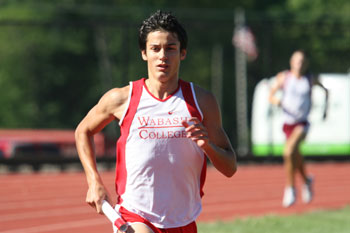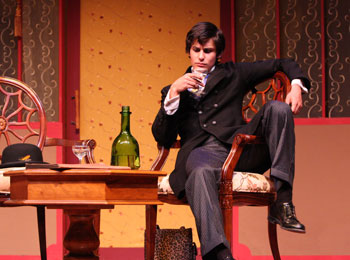 Having qualified for cross country nationals as a sophomore, philosophy major and actor Seth Einterz '11 wants to take the rest of the team with him next year.
Having qualified for cross country nationals as a sophomore, philosophy major and actor Seth Einterz '11 wants to take the rest of the team with him next year.
As sophomore Seth Einterz stood in the starting box minutes before the gun sounded to begin the NCAA Division III national championship race last November, he looked down the line at the more than 200 runners who had qualified for the meet. A sense of pride washed over him; he had achieved his goal to qualify for the national champion-ships.
"That was cool," he recalls.
Then he turned to look behind him and the mood changed.
"When I looked back, there were no guys standing behind me wearing red; none of my teammates were there with me. I felt isolated, and that was a new experience for me.
"I enjoy the team aspect—the brotherhood of support. We push each other in order to achieve great things."
Einterz’ goal moving forward is for Wabash to qualify for nationals as a team, and from there to post a top-10 finish. And it’s not just a pipe dream. "There’s not much point in competing if you don’t think you’ll get there," he says with a serious look.
An all-conference, all-regional runner, Einterz would go on to finish in the middle of the pack at the national championship race. The disappointing finish, he says, was due in part to not "resetting" himself after the excitement of the qualifying meet.
There haven’t been many disappointing finishes through the first half of the philosophy major’s Wabash career. He achieved a perfect grade point average in each of his first three semesters at the College while grinding through five courses each term. On top of that, he was the cross country team’s MVP as a rookie, pledged Kappa Sigma, and had leading roles in two Wabash theater productions in the second semester.
The hard work and dedication paid off —he received the Paul T. Hurt Outstanding Freshman Award.
Einterz likes a challenge. In fact, it was a challenge from a high school counselor that convinced him to enroll at Wabash. After Seth had been admitted to the University of Chicago and Indiana and Notre Dame universities, his high school counselor told him Wabash couldn’t provide the launching pad for his future like the other schools.
Seth, the third of six children, needed only to look at his father, Bob ’77, two uncles, and a cousin, all of whom graduated from Wabash, to get a better view of the launch site.
"In the end, I knew the alumni—as in my family—and I knew I wanted to be like them," he says of his decision. "I knew Wabash could get me any place I wanted."
He’s also trying to get the most out of his time at Wabash. Cross country, fraternity, theater, track and field, and the classroom all expose him to new people and new experiences, which he says allows him to "really see the diversity of Wabash."
 In high school, Einterz focused on sports and academics. He started down the same path at Wabash, but on a whim auditioned for the Wabash play "Never the Sinner," the theatrical adaptation of the story of Leopold and Loeb’s ghastly murder of 14-year-old Bobby Franks. Director Dwight Watson cast Einterz in the lead role as Richard Loeb, the 18-year-old University of Michigan graduate who thought up the kidnapping and murder plot.
In high school, Einterz focused on sports and academics. He started down the same path at Wabash, but on a whim auditioned for the Wabash play "Never the Sinner," the theatrical adaptation of the story of Leopold and Loeb’s ghastly murder of 14-year-old Bobby Franks. Director Dwight Watson cast Einterz in the lead role as Richard Loeb, the 18-year-old University of Michigan graduate who thought up the kidnapping and murder plot.
The athlete, who trains at least two hours a day, found the stage an amazing outlet for his creativity.
"Being on stage and involved in theater is just incredible; there’s just so much energy." Einterz was later cast in the French farce, "A Flea in Her Ear."
He also realizes time is not on his side. The demands of the classroom and athletics limit the amount of time he can spend on stage. Maintaining his grades and focusing his attention on his coursework have proven to be more difficult in his second year.
"Last year I was really motivated, and I lost some of that this year," he says. "I’m seeing the consequences of that now and I’m disappointed in myself. At the same time, I realize that you need to fail if you’re going to fly."
As Einterz imagines the second half of his academic career, he hopes to delve deeply into his academic interests. He’s working with philosophy professor Mark Brouwer on the design of a new French philosophy course that will have an immersion learning travel component.
"The essence of the academics here is in the student-faculty conversations that take place," says Einterz, who remembers a specific chat with Brouwer. "Coming in as a freshman, I was pretty cocky. I thought, ‘I’m gonna really add something to this place.’ Dr. Brouwer sat me down and said, ‘Seth, you’re not the first smart person to enroll here.’
"I came to realize that the most valuable thing you can do as a student is to let Wabash be what it’s supposed to be. I have realized that the institution is the great change agent for its students and not the other way around."
Just a second semester sophomore, Seth Einterz is growing up quickly. He recalls a time in high school that also provided an important lesson. After a back injury ended his wrestling career, he turned to swimming, where he found himself among the slowest in the pool.
"It helped me in the long run to be awful in swimming; it provided good lessons to learn about being at the bottom of the totem pole. I knew I was working every bit as hard down in lane eight, but that the guys up in the middle lanes were going exponentially faster.
"I think about that a lot now when I’m working with our younger cross country runners as we try to reach our goal of getting back to nationals."